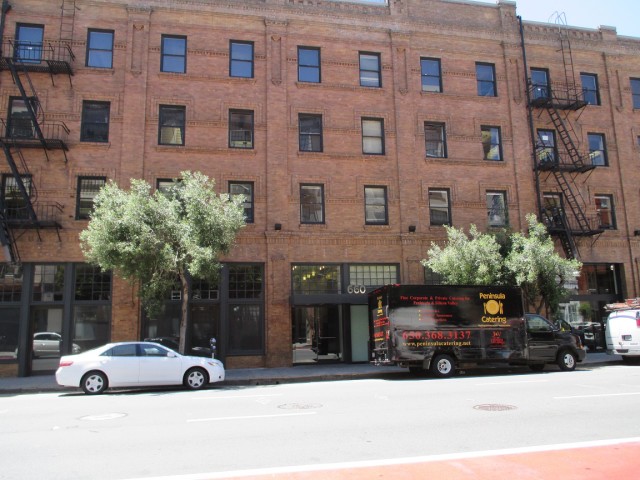Amazing: After losing at every step of the planning process, developers who illegally converted industrial space to offices are trying another appeal

By Zelda Bronstein
SEPTEMBER 14, 2015 — The stand-off between the city and the owners of 660 Third Street, the Rabin family, escalated last Friday: the Rabins’ attorney, David Silverman, of Reuben, Junius & Rose, filed an appeal with the San Francisco Board of Appeals protesting Zoning Administrator Scott Sanchez’s August 28 ruling that his clients had violated City law by retaining office and retail tenants on the bottom two floors of their four-story building.
Sanchez’s decision was one of the rare instances in which the Planning Department has gone after landlords who’ve illegally converted property zoned for Production, Distribution and Repair into offices. Such illegal conversions, typically winked at if not facilitated by the city’s planners, are the major source of the current dire shortage of light industrial space in San Francisco.
The Rabins’ disregard for the city’s zoning laws goes back to the 1990s, when the landlords illegally converted 660 Third from PDR into offices. In 2013 the family asked the city to retroactively authorize that conversion.
Instead, on September 11, 2014 the Planning Commission authorized only the top two stories (40,000 square feet) for conversion into offices. The lower two floors had to revert to their legal PDR use.
The Rabins didn’t appeal that decision, and they paid the associated development impact fees. But they continued to rent the entire building to office users, along with a retail business on the ground floor.
Last April the Planning Department sent the landlords a Notice of Violation and Penalty. The Rabins requested an Administrative Hearing, proposing to show why their defiance of the Planning Commission’s directive was proper. At the hearing, attorney James Reuben, a principal at Reuben, Junius & Rose, asserted that the commission had abused its discretionary authority.
Unconvinced, Sanchez ruled that the landlords were in violation of Planning Code Section 174 and its requirement that “every condition, stipulation, special restriction, and other limitation under the Planning Code shall be complied with in development and use of land and structures.”
On September 11, a year to the day of the Planning Commission’s decision, the Rabins appealed the Zoning Administrator’s ruling on the following grounds:
- The Zoning Administrator prejudicially abused his discretion;
- The Zoning Administrator has not proceeded in the manner required by law;
- The Zoning Administrator Decision is not supported by the findings; and
- The findings of the Zoning Administrator Decision are not supported by the evidence.
The Board of Appeals will hear the appeal, assigned number #15-125, on Wednesday, October 28, at 5 pm in City Hall Room 416. The Appellant’s Brief, limited to 12 double-spaced pages and unlimited exhibits, along with eleven copies, must be submitted by October 8. The Respondent’s and Other Parties’ Briefs, with the same specifications, are due by October 22. Parties to an appeal have seven minutes for presentation and three minutes for rebuttal. Members of the public who are not affiliated with a party may speak once for up to three minutes.
Among the “Special Instructions for Parties” set out on the Board of Appeals website, these are worth noting:
In most cases, the Board applies de novo review, which means that it hears the case fresh and does not need to defer to the findings of fact or determinations made by the underlying decision-maker.
But
Decisions by the Zoning Administor (ZA), other than Variance decisions, require that the Board defer to the ZA unless the Board finds that the ZA erred or abused his or her discretion. Variance decisions are decided under the de novo standard described above.
And
In deciding a case, the Board may only uphold overturn or place conditions on a departmental decision; it cannot remand (send back) a decision to the underlying department for further review or action.
The Board of Appeals has five members appointed for staggered four-year terms. Three are appointed by the mayor and two by the President of the Board of Supervisors. The current members are Ann Lazarus, President; Darryl Honda, Vice President; and Commissioners Frank Fung, Rick Swig, and Robbie Wilson.
The bar is set high for overturning or modifying a departmental decision: appellants must get four out of the five Board members to vote in their favor. In other words, it takes the vote of two Board members for the underlying departmental decision to remain unchanged.






